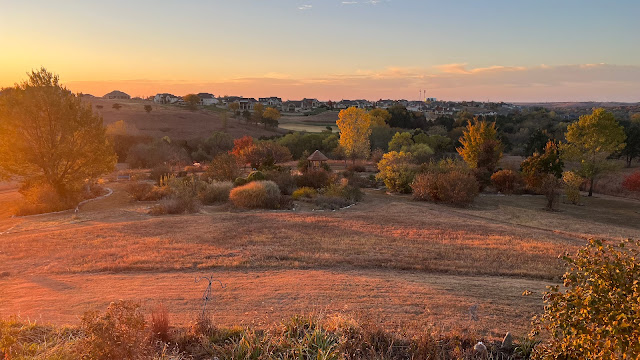Friends, ProfessorRoush apologizes that he has been gone from the garden and this blog for so very long. There is no grandiose excuse, no mealy-mouthed explanation for it, so I'll spare you the diatribe. The facts are that September came, the drought deepened, and my garden and I stopped interacting. Until yesterday, I hadn't mowed the entire garden for at least 5 weeks since it wasn't growing at all, a long stretch broken only by occasional swipes around the driveway and roadsides where the ground gets extra runoff, and I'd been waiting for the first frost to finish things off. Finally, last week, we got that first frost in spades as we hit 22º on our first night below freezing since...well, since I can't remember last spring.

Yesterday, as a result, was a massive day to catch up with my garden and I did it all; mowing the occasional spikes of grass that disturbed the otherwise smooth lawn, bush-hogging the taller prairie grass that I allow to grow as "rain gardens" in the summer, trimming, draining hoses, and just generally making everything look "in ordnung." I'll miss the reddish hues of the tall prairie grass if we ever get rain, but it was browning quickly this year and I don't like to give the pack rats and mice any more room to thrive near the house during the winter then I have to. I just finished repairing 3 downspouts where pack-rats had chewed through the nonmetal drain pipes and I don't need any more.
I was intrigued yesterday by the contrast between the 9/11/2022 photos (above) that I took of a clump of native dotted gayfeather (
Liatris punctata) in the back and its appearance yesterday (right and below left), now mature and ready to spread seed through the garden. I would have mowed this whole area earlier, in fact, but I held off just to let this clump mature, because I want it all through the backyard grass.
Nothing attracts butterflies like gayfeather, so you can just consider this my gift to future generations with colorful wings. I'm hoping the whirling blades of the bush-hog spread it over the entire area and covered it with grass mulch for best germination.
Dotted gayfeather, appropriately for Kansas, is a member of the Sunflower family. Drought-tolerant, its tap root can reach down 15 feet for water, and it doesn't transplant well as a result. You have to cultivate it where you find it, wherever God and the winds decide to plant it. It is flavorful to cattle, so I don't see it bloom in my pastures, just in the protected areas fenced away and allowed to flourish. And roadsides in areas that aren't mowed by the road crews.
Other than these ramblings, my fall has been a kaleidoscope of spectacular sunrises and sunsets. I've taken a number of pictures of shining examples of both over the past month, always intending to share them on the blog but never quite sitting down to it. So I'll leave you, today, with my back yard this morning at sunrise, yellows and tans and browns and russets all blending into the horizon, and all neat and clean from yesterday's mowing. While several trees are already bare, you can see the yellow cottonwood stand out tall and, to its left, a shorter red oak beginning to brighten up the view. Soon enough, it will all be white, so I'm going to covet the colors as long as I can.





.jpg)







.jpg)
.jpg)
.jpg)